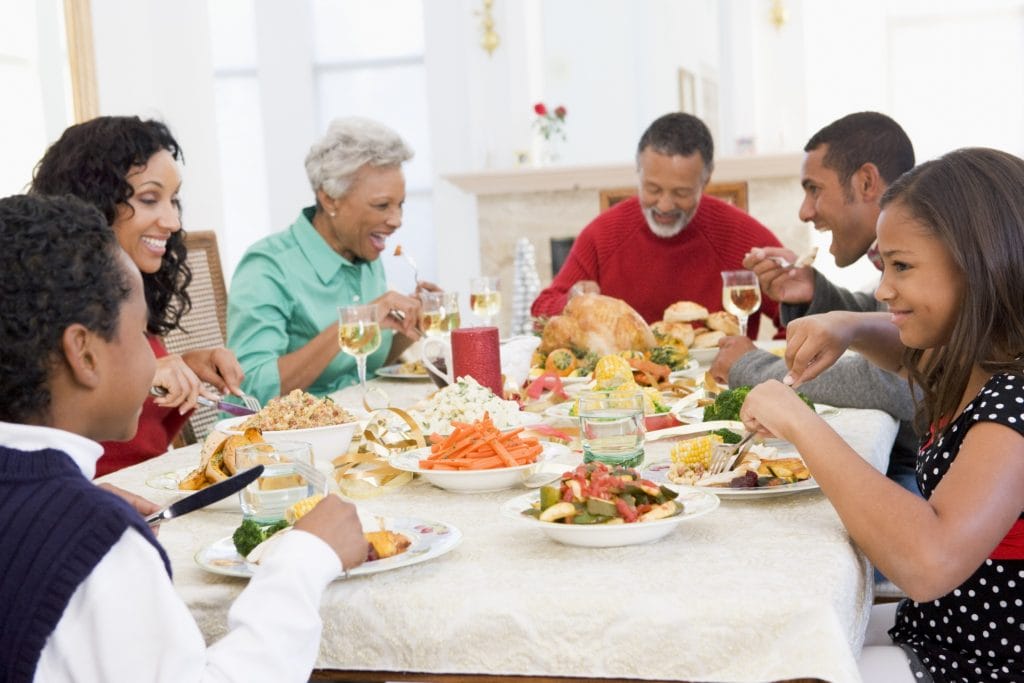
Time with Friends and Relatives
Socializing with out-of-town family or friends can be tricky because they may not fully understand the risks that food allergies present and the precautions you or your child need. Following are tips for visiting relatives from Allergic Living and expert contributors.
Be polite, clear and assertive – and never feel bad about saying no to a food or beverage that is offered to you. It’s far better to be safe and enjoy your time away than to get an impromptu tour of the local emergency room.
Be in the kitchen when food is being prepared, read labels and help out. If you’re not sure about the food on offer, bring your own. People may ask why you’re not eating what they’re eating, but before long, they won’t even notice the difference – and you can kick back and enjoy a little peace of mind on your holiday.
Keeping Peace in the Family
Combine food allergies or celiac disease and staying with relatives, and sometimes misunderstandings arise and dinner preparations can dissolve into a family argument. What’s the solution? Smart, organized communication – and don’t wait until you’ve arrived to lay the groundwork.
Remind the family hosts – preferably by e-mail for handy reference – that you or your allergic family member has some special needs. Detail the allergies, the necessity for label reading and suggest what you can do to make the mealtime process easier for people new to these diet restrictions.
We also asked some experts for their tips for visiting relatives and keeping family peace. They gave a most helpful range of advice.
Beverley Cathcart-Ross
Parenting Coach, founder of the Parenting Network
- Step 1: Find a calm, appropriate time for everyone to discuss your or your child’s food allergies. Five minutes before the meal is served is not going to work.
- Step 2: To win people’s cooperation you need to acknowledge their viewpoint, or you could end up in an argument. Don’t defend or say “yes, but”. First stay quiet and listen carefully – even if you don’t agree.
- Step 3: In 10 words or less, speak about how you feel. Calmly say something like, “I care too much about this family to fight” – then be quiet. Repeating your concerns won’t strengthen your cause.
- Step 4: Brainstorm. Together with your family, make a list of two or three things that would improve the situation. Remember: work toward improvement, not perfection. You just want family gatherings to run safely.
Laurie Harada
Former executive director, Food Allergy Canada
- The first tips for visiting: it’s not just what you say; it’s your choice of words and tone of voice. Stay away from phrases like, “You should do this” and “Why aren’t you doing that?” These will put a person on the defensive.
- Step back, think of it from their perspective. Figure out what you do that gets your family members’ backs up, and consider what to do differently next time.
- Ask a neutral friend for his or her take on your tone, body language and choice of words before you have the big talk with relatives. Pick someone who will tell the truth, not just what you want to hear.
Gina Clowes
Parenting coach and director of Allergymoms.com
- People with allergies or allergic parents might share how it feels when their child is unable to take a cookie from the holiday buffet table. The emotional pull of this is huge, but those who do not live in our shoes have no idea until we share it with them.
- Most of the people who love us will listen, but we need to put our thoughts and concerns into words. People can sometimes misinterpret our rules and ways of life, and think it’s about control when it’s not. It’s about safety, inclusion and love.
Dr. Eyal Shemesh
Associate professor of pediatrics and psychiatry at Mount Sinai School of Medicine
- There are healthy ways to avoid allergens, but sometimes we avoid more than we need to – and this can lead to “avoidance coping.” For example, it may be unreasonable to expect a relative’s home to be allergen-free, but it’s safe to visit as long as there’s no exposure to harmful foods. Avoidance coping would mean not visiting the relative’s home at all because of the fear of allergens, even though exposure can be prevented.
- Avoidance coping blurs the line between what is allowed and what is not – and that leads to anxiety rather than confidence, because people can become afraid of safe, as well as unsafe, circumstances.
See Also:
Family Food Feud: Relatives and Allergies
When Family Doesn’t ‘Get’ Allergies





